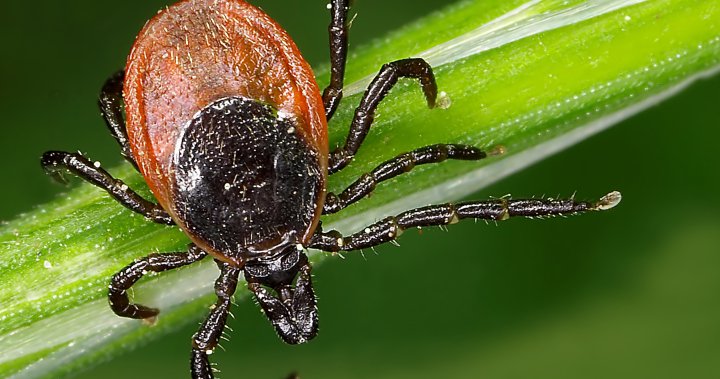
‘They’re hungry’: Ticks are waking up in Canada as weather warms
Global News
Canada's warming temperatures signal the arrival of spring and blooming flowers, but they also stir ticks from their winter hiding spots, poised to latch onto unsuspecting hosts.
Canada’s warming temperatures signal the arrival of spring and blooming flowers, but they also stir ticks from their winter hiding spots, poised to latch onto unsuspecting hosts after months of inactivity.
Given the unseasonably warm winter experienced in many parts of the country, experts caution that these ticks likely emerged weeks ago, primed and ready to strike.
“Ticks have started. They only need about 4 C and they’re active and they’re questing,” explained David Beresford, an entomology professor at Trent University in Oshawa, Ont. “They want to grab on and they want to bite.”
Warmer temperatures and shifting weather patterns have created more favourable conditions for ticks to thrive and expand their habitats across Canada. This expanding range brings them into closer contact with humans and animals, heightening the risk of tick-borne illnesses.
Lyme disease is the most common tick disease in Canada and is primarily spread by deer ticks. It’s been on the rise in Canada over the last decade due to climate change. It’s caused by a bacteria called Borrelia burgdorferi and is transmitted through the bites of infected deer ticks.
In 2022 there were 2,168 reported cases of Lyme disease across Canada – up from just 144 cases reported in 2009, according to the latest Health Canada data.
During a Canadian winter, ticks seek shelter in protected areas like leaf litter or under logs, or burrow under the snow and into the soil to stay insulated.
As temperatures begin to rise — typically around 4 C — ticks become active again. They emerge from their winter hiding spots and start seeking hosts for blood meals. In Canada, the timing of tick activity can vary depending on the specific region and local climate conditions. Balmier temperatures and increased humidity generally trigger their emergence, according to Beresford.





















 Run 3 Space | Play Space Running Game
Run 3 Space | Play Space Running Game Traffic Jam 3D | Online Racing Game
Traffic Jam 3D | Online Racing Game Duck Hunt | Play Old Classic Game
Duck Hunt | Play Old Classic Game